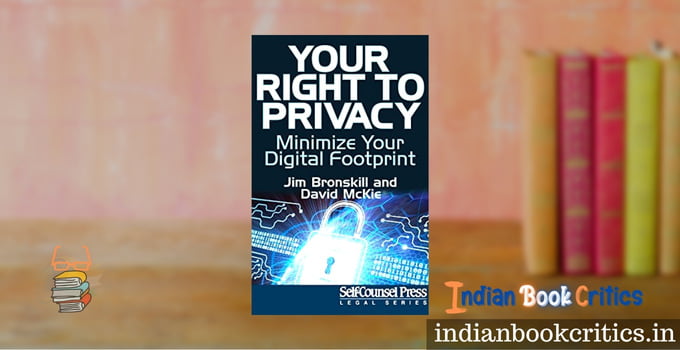With the rapidly increasing size of the tower known as dependency on technology, the world has forgotten a few good lessons taught by the earliest teachers – never become cosy with a stranger; never trust an offer too good to be true; never share personal details with anyone too easily! Voila! The internet has changed it all and we have become too comfortable surfing unknown webpages and putting personal, financial and otherwise details everywhere like that. And therefore, the right to privacy, the right to be let alone, and the right to stay unharmed over the internet has become very important for generation z. How can it be achieved? What are the steps one must take to secure one’s digital footprint? And, the biggest question is how to minimise one’s digital footprint.
In the book Your Right to Privacy: Minimise your digital footprint (legal), authors Jim Bronskill and David McKie argue with historical background and present scenario juxtaposed (rather amicably). Though the authors have tried to be as simple as they can, the arguments tend to be complex at times and might deter the end-user, or the readers, from reading. Nevertheless, that’s only occasional and readers will find pin-pointed lists of facts, steps to be taken and points to be noted every here and there in the book.
Since the book was published back in 2016 (and I accept I am late in reading it), many things have changed – 4G, 5G, META, advances in online gaming and betting and so forth. Therefore, I hope the book gets updated with all these details. Otherwise, there are basic details such as identifying the spoof pages, phishing scams, lucrative offers and insecure pages. Readers (noobs) can take advantage of these basic steps and secure their important data online. Experts will only revel in the legal aspects of their data, understanding how data can be [mis]used and even [ab]used.
To be fair to the book, legal aspects have been detailed in a very lucid manner and I am sure that will be useful to anyone reading in any country. For example, what you can shoot with your phone camera? Where can you record videos? How can you use drones fairly? How can you use your security or surveillance cameras responsibly? There are many things that this book teaches in a very simple way just like A-B-C…
And, to end, the book is useful but outdated and misses many things. Just get an updated edition and I am sure readers will find it very useful and contemporary once again. You can get a copy of this book and learn some legal aspects of data. Your or his, hers or theirs, mine or ours!
Get a copy of this book – click here for the Amazon India link
Review by Sarthak for Indian Book Critics
Your Right to Privacy: MInimize your digital footprint by Jim Bronskill & David McKie – Review
-
IBC Critical Rating
Summary
While the book helps, it needs a revised edition with the dawn of new technologies.
